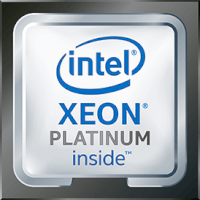Intel Xeon Platinum 8180
The Intel Xeon Platinum 8180 operates with 28 cores and 56 CPU threads. It run at 3.80 GHz base 2.80 GHz all cores while the TDP is set at 205 W.The processor is attached to the LGA 3647 CPU socket. This version includes 39.00 MB of L3 cache on one chip, supports 6 memory channels to support DDR4-2666 RAM and features 3.0 PCIe Gen 48 lanes. Tjunction keeps below -- degrees C. In particular, Skylake Architecture is enhanced with 14 nm technology and supports VT-x, VT-x EPT, VT-d. The product was launched on Q3/2017

| Frequency | 2.50 GHz |
| CPU Cores | 28 |
| CPU Threads | 56 |
| Turbo (1 Core) | 3.80 GHz |
| Turbo (28 Cores): | 2.80 GHz |
| Hyperthreading | Yes |
| Overclocking | No |
| Core Architecture | normal |
Where to Buy?
Buy Intel Xeon Platinum 8180
Memory & PCIe
| Memory type | DDR4-2666 |
| Max memory | |
| Memory channels | 6 |
| ECC | Yes |
| Bandwidth | -- |
| PCIe | 3.0 x 48 |
Encryption
| AES-NI | Yes |
Internal Graphics
| Memory type | DDR4-2666 |
| GPU name | no iGPU |
| GPU frequency | |
| GPU (Turbo) | No turbo |
| Generation | |
| DirectX Version | |
| Execution units | |
| Shader | |
| Max memory | -- |
| Max. displays | |
| Technology | 14 nm |
| Release date |
Technical details
| Instruction set (ISA) | x86-64 (64 bit) |
| Architecture | Skylake |
| L2-Cache | -- |
| L3-Cache | 39.00 MB |
| Technology | 14 nm |
| Release date | Q3/2017 |
| Socket | LGA 3647 |
Thermal Management
| TDP (PL1) | 205 W |
| TDP (PL2) | -- |
| TDP Up | -- |
| TDP Down | -- |
| Tjunction max | -- |
Cinebench R20 (Single-Core)
Cinebench R20 is the successor of Cinebench R15 and is also based on the Cinema 4 Suite. Cinema 4 is a worldwide used software to create 3D forms. The single-core test only uses one CPU core, the amount of cores or hyperthreading ability doesn't count.
Cinebench R20 (Multi-Core)
Cinebench R20 is the successor of Cinebench R15 and is also based on the Cinema 4 Suite. Cinema 4 is a worldwide used software to create 3D forms. The multi-core test involves all CPU cores and taks a big advantage of hyperthreading.
Cinebench R15 (Single-Core)
Cinebench R15 is the successor of Cinebench 11.5 and is also based on the Cinema 4 Suite. Cinema 4 is a worldwide used software to create 3D forms. The single-core test only uses one CPU core, the amount of cores or hyperthreading ability doesn't count.
Cinebench R15 (Multi-Core)
Cinebench R15 is the successor of Cinebench 11.5 and is also based on the Cinema 4 Suite. Cinema 4 is a worldwide used software to create 3D forms. The multi-core test involves all CPU cores and taks a big advantage of hyperthreading.
Geekbench 3, 64bit (Single-Core)
Geekbench 3 is a cross plattform benchmark that heavily uses the systems memory. A fast memory will push the result a lot. The single-core test only uses one CPU core, the amount of cores or hyperthreading ability doesn't count.
Geekbench 3, 64bit (Multi-Core)
Geekbench 3 is a cross plattform benchmark that heavily uses the systems memory. A fast memory will push the result a lot. The multi-core test involves all CPU cores and taks a big advantage of hyperthreading.
Cinebench R11.5, 64bit (Single-Core)
Cinebench 11.5 is based on the Cinema 4D Suite, a software that is popular to generate forms and other stuff in 3D. The single-core test only uses one CPU core, the amount of cores or hyperthreading ability doesn't count.
Cinebench R11.5, 64bit (Multi-Core)
Cinebench 11.5 is based on the Cinema 4D Suite, a software that is popular to generate forms and other stuff in 3D. The multi-core test involves all CPU cores and taks a big advantage of hyperthreading.


